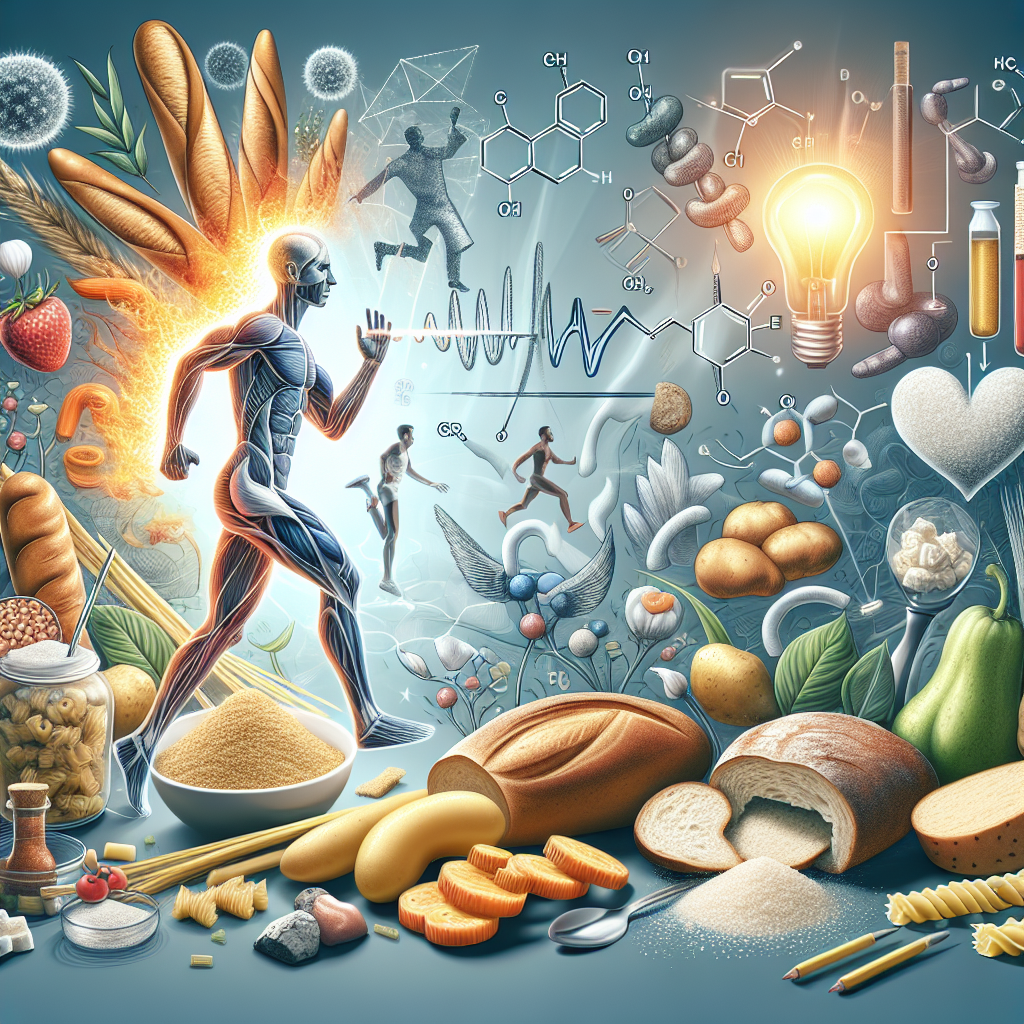Do you ever feel confused and uncertain about whether carbohydrates are good or bad for you? In this article, you will uncover the truth about carbohydrates and demystify the common misconceptions surrounding them. With a friendly and approachable tone, we will guide you through the science behind carbohydrates, their role in your overall health, and offer practical tips to achieve a balanced and sustainable carbohydrate intake. Get ready to uncover the truth and make informed choices about carbohydrates that align with your unique goals and lifestyle.
What are carbohydrates?
Carbohydrates are one of the three macronutrients essential for your body’s proper functioning, alongside proteins and fats. They are the main source of energy for your body and play a crucial role in various bodily functions. Carbohydrates are made up of carbon, hydrogen, and oxygen atoms, and their molecular structure determines their classification as simple or complex carbohydrates.
Types of carbohydrates
Simple carbohydrates
Simple carbohydrates, also known as simple sugars, are made up of one or two sugar molecules. They are typically found in foods such as fruits, milk, and processed sugars. These carbohydrates are quickly broken down by the body, resulting in a rapid increase in blood sugar levels. While they provide instant energy, excessive consumption of simple carbohydrates can lead to blood sugar imbalances and weight gain.
Complex carbohydrates
Complex carbohydrates are made up of multiple sugar molecules and are commonly found in foods such as whole grains, legumes, and vegetables. Due to their more intricate structure, complex carbohydrates take longer to be broken down by the body, resulting in a slower release of energy over time. They provide a steady source of fuel for your body, promoting sustained energy and helping to keep you feeling fuller for longer.

Sources of carbohydrates
Grains and cereals
Grains and cereals, such as rice, wheat, oats, and corn, are rich sources of complex carbohydrates. They provide a range of essential nutrients like fiber, vitamins, and minerals, along with a steady supply of energy. Opting for whole grain options, such as whole wheat bread or brown rice, ensures you get the maximum benefits of these carbohydrates without excessive processing and added sugars.
Fruits and vegetables
Fruits and vegetables are packed with a variety of carbohydrates, including both simple and complex sugars. While fruits contain natural sugars, they also offer a wide array of vitamins, minerals, and fiber, making them a nutritious choice. Vegetables, on the other hand, are low in calories and rich in complex carbohydrates, making them an excellent addition to a balanced diet.
Legumes and pulses
Legumes and pulses, such as lentils, chickpeas, and beans, are not only excellent sources of plant-based proteins but also rich in complex carbohydrates. They provide a long-lasting energy source, along with essential vitamins, minerals, and fiber. Incorporating legumes and pulses into your meals can help increase carbohydrate intake while promoting overall health.
Dairy products
Dairy products, such as milk and yogurt, contain a sugar known as lactose. While lactose is a simple carbohydrate, it is accompanied by essential nutrients like calcium, vitamin D, and protein. However, individuals with lactose intolerance should be mindful of their intake or opt for lactose-free alternatives.
Added sugars
Added sugars, commonly found in processed foods and beverages, are a source of simple carbohydrates. These sugars are often refined and offer little to no nutritional value. Consuming excessive amounts of added sugars can lead to weight gain, tooth decay, and an increased risk of chronic diseases. It is essential to read food labels and prioritize whole, unprocessed foods to limit your intake of added sugars.
Carbohydrates and energy
Carbohydrates are the preferred source of fuel for your body. When consumed, carbohydrates are broken down into glucose, which can be readily used by your cells to produce energy. This energy is vital for everyday activities, from basic bodily functions like breathing and digestion to high-intensity physical exercise.
Choosing the right types and portions of carbohydrates is crucial for maintaining optimal energy levels. Complex carbohydrates provide a sustained release of energy, while simple carbohydrates offer a quick energy boost. Balancing your carbohydrate intake with other macronutrients, such as proteins and fats, can help optimize energy utilization and ensure steady fuel throughout the day.

Impact of carbohydrates on blood sugar
Carbohydrates have a significant impact on your blood sugar levels. When you consume carbohydrates, they are converted into glucose and enter your bloodstream. The rise in blood sugar triggers the release of insulin, a hormone that helps transport glucose into cells for energy production or storage.
Simple carbohydrates are quickly digested and result in a rapid increase in blood sugar levels. This sudden spike may lead to a subsequent drop in blood sugar, causing feelings of fatigue and hunger. Complex carbohydrates, on the other hand, are digested more slowly, leading to a more gradual and steady rise in blood sugar levels. This slow release helps maintain stable energy levels and prevents drastic fluctuations in blood sugar.
Carbohydrates and weight management
Carbohydrates often receive mixed reviews when it comes to weight management. However, it’s important to remember that the quality and quantity of carbohydrates consumed play a significant role.
While excess consumption of simple carbohydrates, especially those from added sugars and processed foods, can contribute to weight gain, complex carbohydrates can be part of a healthy diet. They provide essential nutrients, fiber, and a sense of satiety, helping you feel fuller for longer and potentially reducing overall calorie intake.
To support weight management, it is essential to focus on portion control, balance carbohydrates with proteins and fats, and choose nutrient-dense sources of carbohydrates, such as whole grains, fruits, and vegetables.
The role of carbohydrates in brain function
Carbohydrates play a critical role in brain function. Glucose, obtained from the breakdown of carbohydrates, is the primary source of energy for your brain. Your brain relies heavily on a constant supply of glucose to maintain optimal cognitive function, including memory, attention, and decision-making.
When carbohydrate intake is limited, such as in low-carb diets, the body resorts to an alternative energy source called ketones. While ketones can provide energy, some studies suggest that high ketone levels may affect brain function and cognitive performance. It is important to note that individual responses to low-carb diets may vary, and adequate carbohydrate intake should be tailored to meet individual needs, especially when it comes to brain function.
Carbohydrates and gut health
Carbohydrates, particularly those rich in fiber, play a vital role in promoting gut health. Fiber is a non-digestible carbohydrate that passes through the digestive system relatively intact. It adds bulk to the stool, aids in regular bowel movements, and supports the growth and diversity of beneficial gut bacteria.
Consuming an adequate amount of dietary fiber can help prevent constipation and maintain a healthy digestive system. Whole grains, fruits, vegetables, legumes, and pulses are excellent sources of dietary fiber and should be incorporated into your diet to support gut health.
The myth of low-carb diets
Low-carb diets have gained popularity in recent years, with claims of rapid weight loss and improved health. While these diets may lead to short-term weight loss due to calorie restriction, they are not without potential risks and considerations.
Understanding low-carb diets
Low-carb diets typically restrict carbohydrate intake while increasing protein and fat consumption. This shift in macronutrient ratios forces the body to utilize stored fat for energy production, leading to weight loss. However, it is important to note that not all carbohydrates are created equal, and not all low-carb diets are the same.
Some low-carb diets, such as the ketogenic diet, severely restrict carbohydrate intake to induce a state of ketosis. This state forces the body to produce ketones for energy, rather than relying on glucose from carbohydrates. While some individuals may thrive on low-carb diets, it is essential to consider long-term sustainability and individual health goals.
Potential risks of low-carb diets
Low-carb diets may have potential risks, particularly when followed for an extended period. Severely restricting carbohydrates can lead to nutrient deficiencies, as many important vitamins, minerals, and fiber are primarily found in carbohydrate-rich foods. Additionally, eliminating or severely limiting certain food groups may result in limited dietary diversity and potentially compromise overall nutrient intake.
It is essential to consult with a healthcare professional or registered dietitian before embarking on a low-carb diet to ensure it aligns with your specific health needs and goals. They can provide personalized recommendations and guide you on how to maintain a balanced and sustainable approach to nutrition.
Carbohydrates and exercise performance
Carbohydrates play a crucial role in exercise performance, particularly for activities requiring high-intensity efforts or endurance. When you engage in physical activity, your body relies on glycogen stores (glucose stored in muscles and the liver) to provide energy. Consuming carbohydrates before and during exercise can help optimize glycogen stores and delay fatigue, allowing you to perform at your best.
For shorter, high-intensity activities, such as sprinting or weightlifting, consuming readily available carbohydrates shortly before or during exercise may enhance performance. However, for longer endurance activities, such as distance running or cycling, a strategy known as carbohydrate loading, which involves increasing carbohydrate intake in the days leading up to the event, can help maximize glycogen stores and sustain energy levels.
It is important to note that individual carbohydrate needs may vary based on factors like exercise intensity, duration, and personal preferences. Experimenting with different timing and types of carbohydrates, along with proper hydration, can help you find the optimal fueling strategy for your exercise routine.
In conclusion, carbohydrates are a vital part of a healthy diet and play numerous roles in our overall well-being. It is important to choose quality sources of carbohydrates, such as whole grains, fruits, and vegetables, and to balance our intake with other essential nutrients. By understanding the different types of carbohydrates and their impact on our body, we can make informed choices and enjoy the benefits of these macronutrients while promoting our health and wellness.

